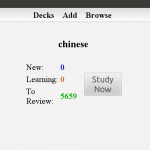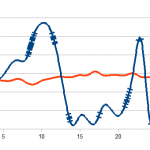Articles in the ‘Organising and planning’ category Page 7
-
Flashcard overflow: About card models and review directions
The question of how to design flashcards is faced by all learners who use them. What should you put on the front? What should you put on the back? Should you add single characters or whole words? Or perhaps sentences are better? The general answer is that it depends and this article discusses some of the factors the answers depend on.
Read → -
Learning how to fish: Or, why it’s essential to know how to learn
Learning how to learn Chinese is an essential skill for any student, regardless if you study on your own or in a course. This article explains why going to class is not enough.
Read → -
Preparing for rainy days and dealing with slumps
We all experience slumps in our learning, but there are many things we can do to reduce the negative effects of these slumps. The solution is three-fold: Preparing for the slump before it hits you, finding learning activities that don’t feel like work and paying attention to what you feel capable of at the moment. You will still experience slumps, but hopefully they will be less severe!
Read → -
Your slumps affect your language learning more than your flows
There are people who go on binges and study like maniacs for short periods of time, but then run out of steam and have slump lasting considerably longer. The problem with this kind of studying is that it really affects your average output. The best is to have a steady, regular performance that gives you the mileage you need without burning yourself out completely. This article examines this problem in greater detail and gives some suggestions for how to improve your slumps.
Read → -
What’s your next step to master Chinese?
Procrastination is a major problem facing anyone trying to learn Chinese outside class (which should include almost everyone because if you only do what you’re required to do in class, you won’t get very far). In this article, I share some ideas on how I handle big projects and intimidating tasks. The gist is that you need to break things down and you need to know what your next action is.
Read → -
Why you need goals to learn Chinese efficiently
Learning without goals might seem like a reasonable choice at first, but after a closer look, it isn’t such a good idea. First, it’s hard to imagine not having any goal at all, so setting goals is more about making your implicit goals explicit. Second, focusing only on having fun will lead to some very unusual learning strategies.
Read → -
The get-back-up-to-speed summer challenge
This is a challenge to encourage readers (and myself) to get more out of the remaining weeks of the summer. I have huge Anki and skritter queues and I plan to fight the down to zero before September 1st. You might need to study more vocabulary or you might have other things you want to complete this summer. Will you join the challenge?
Read → -
If you think spaced repetition software is a panacea you are wrong
Spaced repetition software (SRS) is widely discussed online, and generally speaking, there is a spectrum between people who think SRS is the holy grail of learning anything and those that think SRS is artificial, passive and just a waste of time. This article argues that this polarisation is a serious mistake, SRS is a tool and like any other tool, how we use it determines what we get from it.
Read → -
Learning how to learn Chinese through self-experimentation
Rigorous scientific research typically requires large sample sizes, otherwise it isn’t possible to draw any conclusions about the population at large, which is the goal of most studies. However, experimenting with yourself as the only participant might not be relevant for other learners, but it’s highly relevant for you. This article is about how to use self-experimentation to learn Chinese.
Read → -
Is your flashcard deck too big for your own good?
If you use spaced repetition software like Anki for learning Chinese and do so for a few years, you will end up with a very large flashcard deck. Some people advocate deleting the deck if it becomes too big. This article looks closer at the pros and cons of keeping large decks and why you might want to consider starting over from scratch.
Read →








